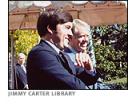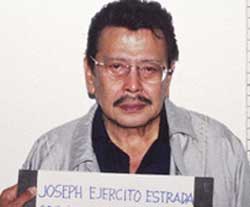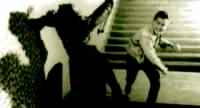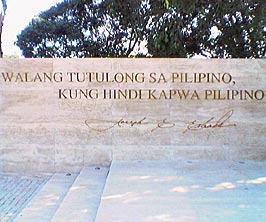Memoes On Horseback
30-Oct-07
 The National Archives Doc ‘O The Day for Saturday
The National Archives Doc ‘O The Day for Saturday
Surfacing this picture gives the Archives reason enough to link to a 1998 article in their publication “Prologue,” “I Am Entitled to the Medal of Honor and I Want It” Theodore Roosevelt and His Quest for Glory
The story is a trawl through the documents and secondary sources on Roosevelt’s brief combat experience 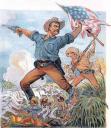 near Santiago Cuba with the Rough Riders, doing his part lifting Spanish Tyranny from the grateful Cuban people [and of course to protect our white women.]
near Santiago Cuba with the Rough Riders, doing his part lifting Spanish Tyranny from the grateful Cuban people [and of course to protect our white women.]
It’s quite a tale. The author points out that Roosevelt’s charge was up Kettle Hill, not neighboring San Juan Hill, and that “By the time the assault reached the top of Kettle Hill the ground was practically deserted by the Spanish soldiers.”
Roosevelt backed up his medal of honor pitch with documents from his superior officers. But the article points out none of them were there, and they largely replicated second hand documents or repeated what he had told them. 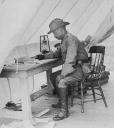
The Theodore Roosevelt Association claimed the author was biased, but perhaps what they object to is the comic effect he achieves quoting TR bluster:
“I don’t know who saw me throughout the fight, because I was almost always in the front and could not tell who was close behind me, and was paying no attention to it.”
He didn’t get the medal, he became President and the issue slumbered. During the 90s an effort to right past military awards wrongs against African-American soldiers was piggy-backed by Roosevelt fans, and Congress passed a bill asking for another review of the record. Which found against Roosevelt.
His Great-Grandson Tweed Roosevelt 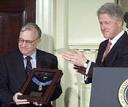 finally received the award during Bill Clinton’s last week in office. This instance is not generally attacked as part of Clinton’s shall we say generous use of his pen on the way out.
finally received the award during Bill Clinton’s last week in office. This instance is not generally attacked as part of Clinton’s shall we say generous use of his pen on the way out.
In the citation it became once again “a desperate and gallant charge up San Juan Hill.”
Clinton was at his wistful, head tilting, wondering best as he repeated the misinformation Roosevelt generated:
“Two high-ranking military officers who had won the Medal of Honor in earlier wars and who saw Theodore Roosevelt’s bravery recommended him for the medal, too. For some reason, the War Department never acted on the recommendation…”



